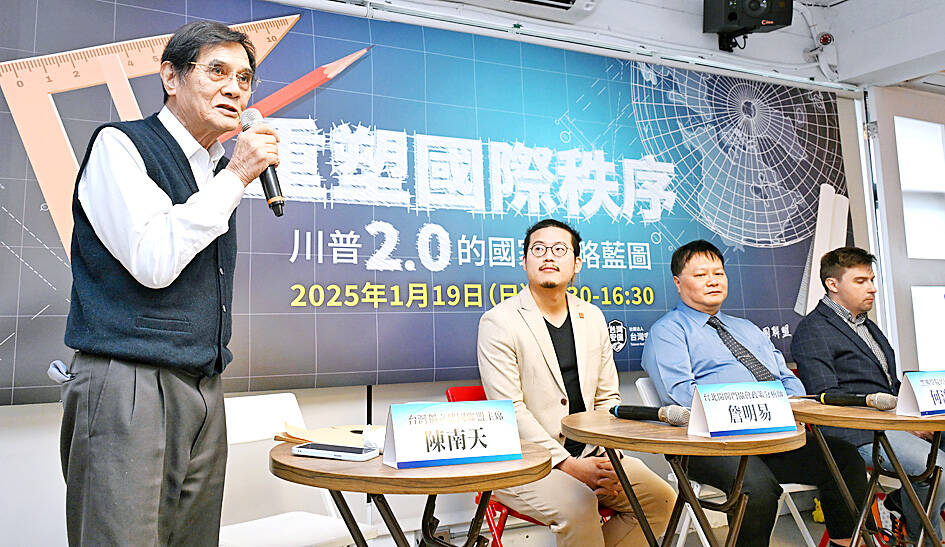Taiwan’s leading edge in semiconductors and other high-tech sectors would play a very important role in forging stronger alliances with democratic countries, headed by incoming US president Donald Trump, to counter the authoritarian regimes of China and Russia, experts said at a forum in Taipei yesterday.
Once he is inaugurated, it would be “Trump 2.0,” World United Formosans for Independence chairman Richard Chen (陳南天) said.
Trump has appointed a new slate of people to take charge of strategies to “reshape the world order,” as current world economies, international relations and wars are very different from those of his first presidency in 2017 to 2021, Chen said.

Photo: Fang Pin-chao, Taipei Times
Trump’s central tenets are “America First” and “Make America Great Again,” which won the support of disenchanted US voters who want industries and jobs to return home to drive new economic growth, Kuma Academy (黑熊學院) cofounder Ho Cheng-hui (何澄輝) said.
“During the campaign, Trump focused on the social instability and insecurity of Americans, brought on by the flood of illegal immigrants, and fentanyl and similar opioid drugs pouring into US. Trump wanted to ensure control by appointing a ‘border czar’ and threatening Canada and Mexico with higher tariffs so they would employ stricter enforcement at their borders with the US,” Ho said.
Trump and the Republicans also criticized Washington, saying it had not faced up to China’s rise as a world power. China has registered growth in its economy, industries, new technologies and military build-up over the past decades, and is challenging the US’ leadership on the global stage, he said.
“Trump has stated his position on these issues and pointed to China as the largest threat to US interests, especially in the Indo-Pacific region. Much of Trump’s new geopolitical strategies are aimed at countering China’s rise and its military expansionism,” Ho said.
Experts agreed that Trump and his new administration would forge a much stronger alliance of like-minded democratic countries, where Taiwan would have a pivotal role, given its central position in the “first island chain,” and its leading edge in semiconductors, artificial intelligence (AI) and computer electronics industries.
The US and Western nations would rely on Taiwan for new high-tech products, electric vehicles and smart military weapons, they said.
Taiwan National Security Institute research fellow Stanislaw Kwiatkowski said that the people Trump appointed to offices that handle foreign affairs and have a direct impact on Indo-Pacific strategies were mostly China hawks who have been friendly to Taiwan and have espoused a tougher stance on US dealings with China.
Trump has sought to end the fighting in the Middle East and to pivot US geopolitical strategy and foreign policy initiatives to the Indo-Pacific region to face China’s rising power, he said.
The US would also seek closer partnerships with Japan, South Korea, Taiwan and India to counter Chinese military expansion and conflict, Kwiatkowski added.
Taiwan would have an even closer relationship with the US and have an enhanced democratic alliance, since Trump, Washington officials and European partners have realized Taiwan’s importance in the supply chain and production of semiconductors, AI technologies and smart weapons, he said.
Countries would want to have a good relationship with Taiwan in the expected economic and trade war, and work together on deterring the so-called “axis of upheaval” — China, Russia, Iran and North Korea, he added.

The manufacture of the remaining 28 M1A2T Abrams tanks Taiwan purchased from the US has recently been completed, and they are expected to be delivered within the next one to two months, a source said yesterday. The Ministry of National Defense is arranging cargo ships to transport the tanks to Taiwan as soon as possible, said the source, who is familiar with the matter. The estimated arrival time ranges from late this month to early next month, the source said. The 28 Abrams tanks make up the third and final batch of a total of 108 tanks, valued at about NT$40.5 billion

A group from the Taiwanese Designers in Australia association yesterday represented Taiwan at the Midsumma Pride March in Melbourne. The march, held in the St. Kilda suburb, is the city’s largest LGBTQIA+ parade and the flagship event of the annual Midsumma Festival. It attracted more than 45,000 spectators who supported the 400 groups and 10,000 marchers that participated this year, the association said. Taiwanese Designers said they organized a team to march for Taiwan this year, joining politicians, government agencies, professionals and community organizations in showing support for LGBTQIA+ people and diverse communities. As the first country in Asia to legalize same-sex

Travel agencies in Taiwan are working to secure alternative flights for travelers bound for New Zealand for the Lunar New Year holiday, as Air New Zealand workers are set to strike next week. The airline said that it has confirmed that the planned industrial action by its international wide-body cabin crew would go ahead on Thursday and Friday next week. While the Auckland-based carrier pledged to take reasonable measures to mitigate the impact of the workers’ strike, an Air New Zealand flight arriving at Taipei from Auckland on Thursday and another flight departing from Taipei for Auckland on Saturday would have to

MOTIVES QUESTIONED The PLA considers Xi’s policies toward Taiwan to be driven by personal considerations rather than military assessment, the Epoch Times reports Chinese President Xi Jinping’s (習近平) latest purge of the Chinese People’s Liberation Army (PLA) leadership might have been prompted by the military’s opposition to plans of invading Taiwan, the Epoch Times said. The Chinese military opposes waging war against Taiwan by a large consensus, putting it at odds with Xi’s vision, the Falun Gong-affiliated daily said in a report on Thursday, citing anonymous sources with insight into the PLA’s inner workings. The opposition is not the opinion of a few generals, but a widely shared view among the PLA cadre, the Epoch Times cited them as saying. “Chinese forces know full well that